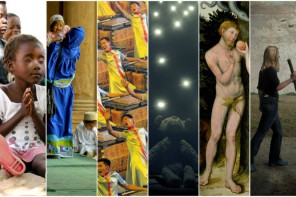The recent Pew survey of US Religious Life has been generating headlines over how ignorant Americans are of religion. Lauri Lebo points out that one of the problems with this survey is that it does not distinguish between those who are actively religious and those who are passively religious. However, I think what most critics fail to realize is how Christian the quiz is.
If you look at the questions on the survey, there is detailed information on different types of Christianity, but almost all other religions are treated as a homogeneous whole. For the sake of simplicity, I will refer to the online quiz at this point only. However, the pattern I am suggesting for the shorter quiz easily maps out onto the larger survey.
Question 2 asks about Mother Teresa’s religion, and two options are “Catholic” and “Mormon.” Pew is either entering a theological debate here, suggesting that Catholics and Mormons are two different religious traditions, or that there is such familiarity with Christianity, the respondent is assumed to know that they are two manifestations of Christianity. The parallelism of religions breaks down when you have two Christian movements listed, instead of “Christianity” against religions like “Judaism” and “Islam.”
As you move through the quiz, the only questions that deal with theology are from a Christian perspective. Question 6 is about transubstantiation, the belief that bread and wine of the Catholic communion is turned into the body and blood of Christ. Most other questions are descriptive: When is the Muslim month of fasting (Q5)? When does the Jewish sabbath begin (Q4)? The only question that is near-theological is Q14, which asks about nirvana. The question is framed in such a way that it could also be descriptive, akin to “what religion believes in heaven with angels.”
On the historical side, there is also a presumed knowledge of American Christian history that I found odd. Question 15 asks about the First Great Awakening. I don’t know how much this is emphasized amongst Christian communities, but the Awakenings are not something that are part of popular culture.
I think this highlights a conclusion of the survey, that we do not know a lot about religion. Pew defaulted to Christian thinking in presenting this survey. As a result, we know that most people are passively religious and that most atheists/agnostics actively choose that path. I would have preferred survey data that showed us that we do not know how to think or talk about religion in the American public sphere. I’ll have to rely on the poor construction of the survey to do that.



